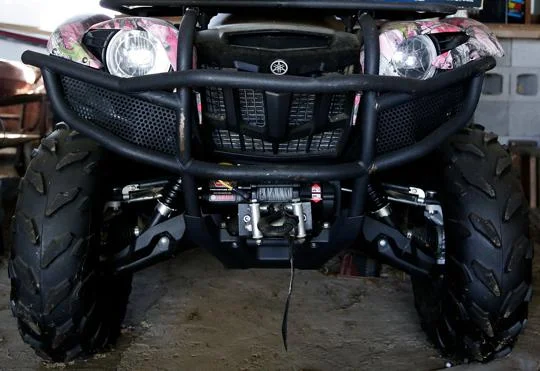Every day, Missouri farmers face hazardous work conditions and potential injury

STOCKTON — What was supposed to be an average day on the farm changed Doug Boswell’s life.
On a cold November day in 2017, Boswell was feeding his cows in Stockton and left the gate open. When he returned to feed them, he realized three of the cows had escaped.
He managed to corral two of them back with his tractor, but one was still loose. So he got on the nearby all-terrain vehicle and chased the cow. But then, his ATV flipped.
He tried to move, but he couldn’t.
“I just couldn’t believe I was paralyzed,” he said.
Boswell lay on the ground for about 45 minutes. He didn’t have his phone with him. His wife, Teresa, was waiting for him in the truck by the barn. They were planning to eat after he fed the cows.
Eventually, his wife realized something was wrong. She walked down the hill from the barn and saw the still-running tractor with two bales on it.
“Then I looked over to the right, and I saw my four-wheeler on its side, and then I looked down and I saw him. And then I just ran,” she said.
She called 911, and when first responders arrived, they checked Boswell’s pulse. It was low. The ambulance to take him to the trauma center was too far away, so they called a helicopter to take him to the hospital.
“All I remember was the scream when they rolled him over to put him on board the helicopter,” Teresa Boswell said. “It was pretty intense.”
Her husband had shattered his right shoulder, punctured a lung and broken several ribs and his back. And he was paralyzed.
Farm hazards
Dozens of accidents like this one happen every year on farms across the state.
Every day, tasks on a farm carry the risk of injury or death. Tractors tip over and crush the operator. Farmers drown in grain silos. Grain augers tear off limbs. Heads are scalped when hair gets caught in spinning tractor parts.
Agriculture is one of the most hazardous industries alongside construction, according to the National Safety Council. In 2015, almost 36,000 farmworkers experienced an injury, according to the Bureau of Labor Statistics’ Survey of Occupational Injuries and Illnesses.
The injury rate on farms in Missouri is almost double the national average for all occupations, according to a survey by the Central States Center for Agricultural Safety and Health, located in Omaha, Nebraska.
Farm injury and safety is an ongoing issue, said Scott Heiberger, health communications manager for the Marshfield Clinic Research Institute, based in Wisconsin, and president-elect of the International Society for Agricultural Safety and Health.
“Whenever I go into a room of farmers or people who work on farms and I just ask for a show of hands: ‘How many people in here personally know somebody who was killed in a farm incident?’ Hands always go up.”

Doug Boswell has been paralyzed from the waist down since November 2017, when this ATV flipped while he was using it to herd escaped cattle. Boswell said he was on the ground for 45 minutes after the accident before his wife found him.
‘How many people have personally experienced a serious farm injury?’ And hands always go up. … That tells us that farm injury and farm safety is an ongoing issue,” Heiberger said.
Missouri is home to nearly 100,000 farms. Those farms make up two-thirds of the state’s land, according to the Missouri Department of Agriculture. More than 96 percent of the state’s farms are considered family-owned, according to the national Census of Agriculture.
Small farms — those with fewer than 10 people working on it — are exempt from federal investigations into workplace injuries. The Occupational Safety and Health Administration doesn’t enforce workplace safety on any farm operation with 10 or fewer employees. So if there is a traumatic injury or death on a small farm, OSHA does not investigate.
For families, an investigation helps them understand exactly what happened to their loved ones, said Tonya Ford, a workplace advocate and executive director of the United Support and Memorial for Workplace Fatalities.
“It also provides answers to the farm or the company in regards to what happened and how we can prevent it from happening again, so others don’t get injured or killed doing the same job,” Ford said. “So a lot of it is prevention and making sure it doesn’t happen again.”
If you have suffered a work-related injury or illness, Northland Injury Law can help ensure you get full and fair compensation under the law. The attorneys at Northland Injury Law are experienced in navigating the ins and out of the workers’ compensation process and their experience can help you with a complicated claim. For a more comprehensive list of all the questions you might have about workers’ compensation, and for a free consultation, please call (816)-400-4878. If you have further questions about your case, do not hesitate to reach out to us by the phone number, through the contact form, or even with the live chat option listed on our site!






